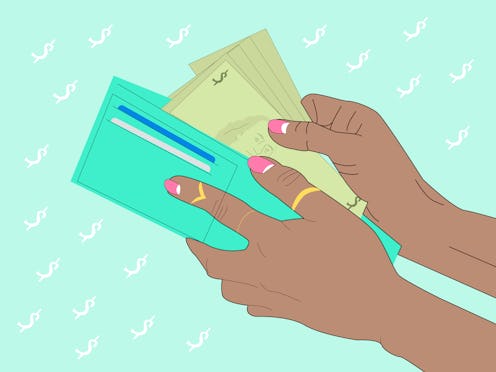
Despite many professional advances on the part of women over the past few years, society as a whole has yet to catch up, especially in the area of finances. Along with the other myriad forms of gender equality, there are many money-related issues women deal with that men often don't have to. And since money is a source of pride, independence, and freedom for many people, these issues are nothing to sneeze at.
When kids are in school, they're taught they can grow up to be whatever they want, but as time goes on, many financial obstacles begin to stand in the way. While some of these obstacles are fairly universal — in order to get into the career you want, you need money to afford school, internships, and whatever (potentially lower-paying) jobs will lead you there — but many are unique to women, including some that affect whether or not you'll have the money to afford all that schooling and all those internships and entry-level jobs. And if you have kids, there are still more factors to consider: Money for childcare, whether you should prioritize higher pay over a job you might like better, and so on. Especially for socioeconomically disadvantaged women, it's hard to escape the constraints money can place on you, and those constraints often affect women's ability to attain equality.
Here are just a few money-related issues that women deal with all the time, while men typically don't:
1. The Gender Wage Gap
Perhaps the most frequently cited money-related statistic in feminist discussions about money is the fact that women make 78 percent that which white men earn. While this may in part be due to different career choices (although let's not forget that even career choice can be the result of institutionalized sexism), the wage gap exists even when men and women are doing the same kind of work. This not only can disadvantage some women financially, but also can contribute to anxiety and depression by fueling the perception that women are worth less, according to a study in Social Science & Medicine.
2. The Pink Tax
The term "the pink tax" refers to the fact that versions of products marketed towards women often cost more than those marketed towards men, even when they have the same ingredients and functions. Products from deodorant to shaving cream to shirts tend to be more expensive if you're a woman. Maybe this is because these things are associated with improving your appearance, which tends to be considered a "feminine" goal; then again, maybe they're not. Whatever the reason, though, it's ironic given that women make less.
3. The Cost Of Menstrual Supplies
This point applies specifically to cisgender men in comparison with not only women, but anyone who menstruates: People with periods spend $1,773 on tampons over the course of their lifetimes, along with $2,280 on new underwear, $1,229 on pain relievers, and other additional costs that might vary from person to person, according to an analysis by The Huffington Post. Another cost compounding this is the "tampon tax": The majority of U.S. states tax tampons as luxury items, as if dealing with periods were optional. While women, trans men, and pretty much every other person who menstruates deal frequently with these additional costs and taxes, cisgender men simply don't.
4. Greater Healthcare Costs
According to The Huffington Post's analysis, people with uteruses spend $11,400 on birth control over their lifetimes. This, along with the high cost of having a baby, contributes to women paying more for healthcare than men.
5. Financial Entrapment In Abusive Relationships
This one can happen to men as well, but it disproportionately affects women: One in four women experience abusive relationships, according to the Center for Disease Control, and 99 percent of them are being controlled through money, making it difficult to leave, according to the Center for Financial Security. This means that women not only have less money than men and have to spend more, but also frequently have their financial position used against them, making it a major obstacle to gender equality.
Images: Liz Minch/Bustle; Giphy (5)